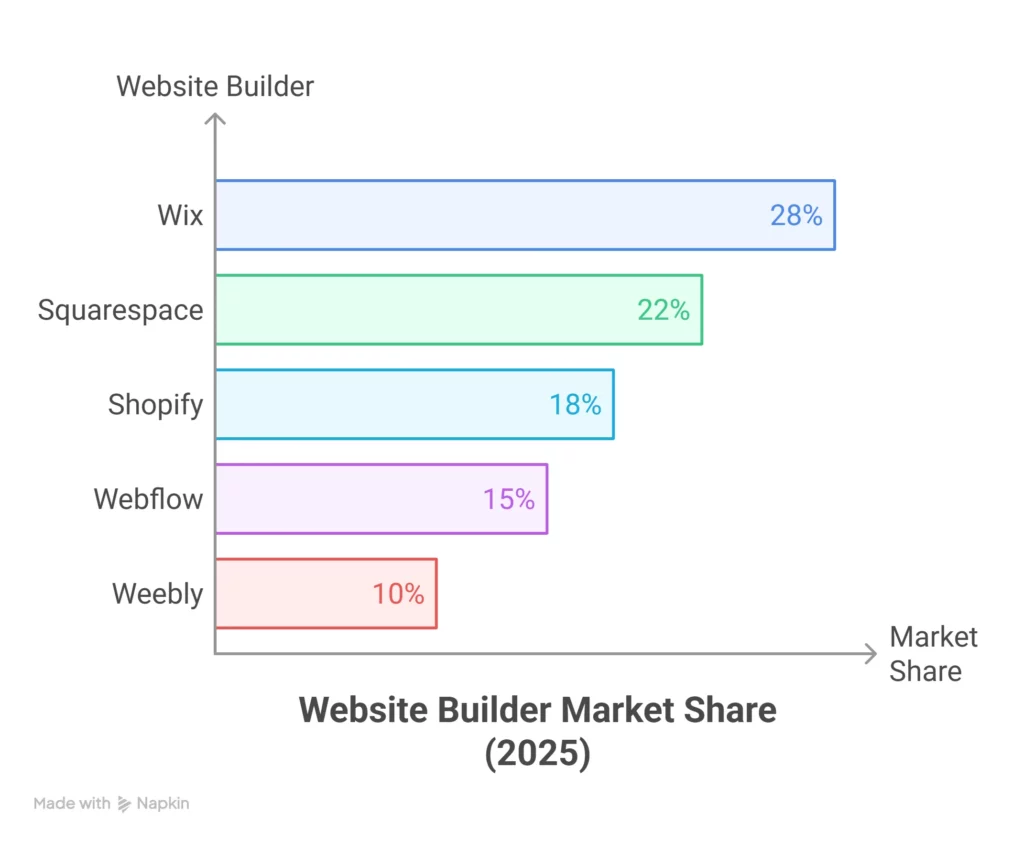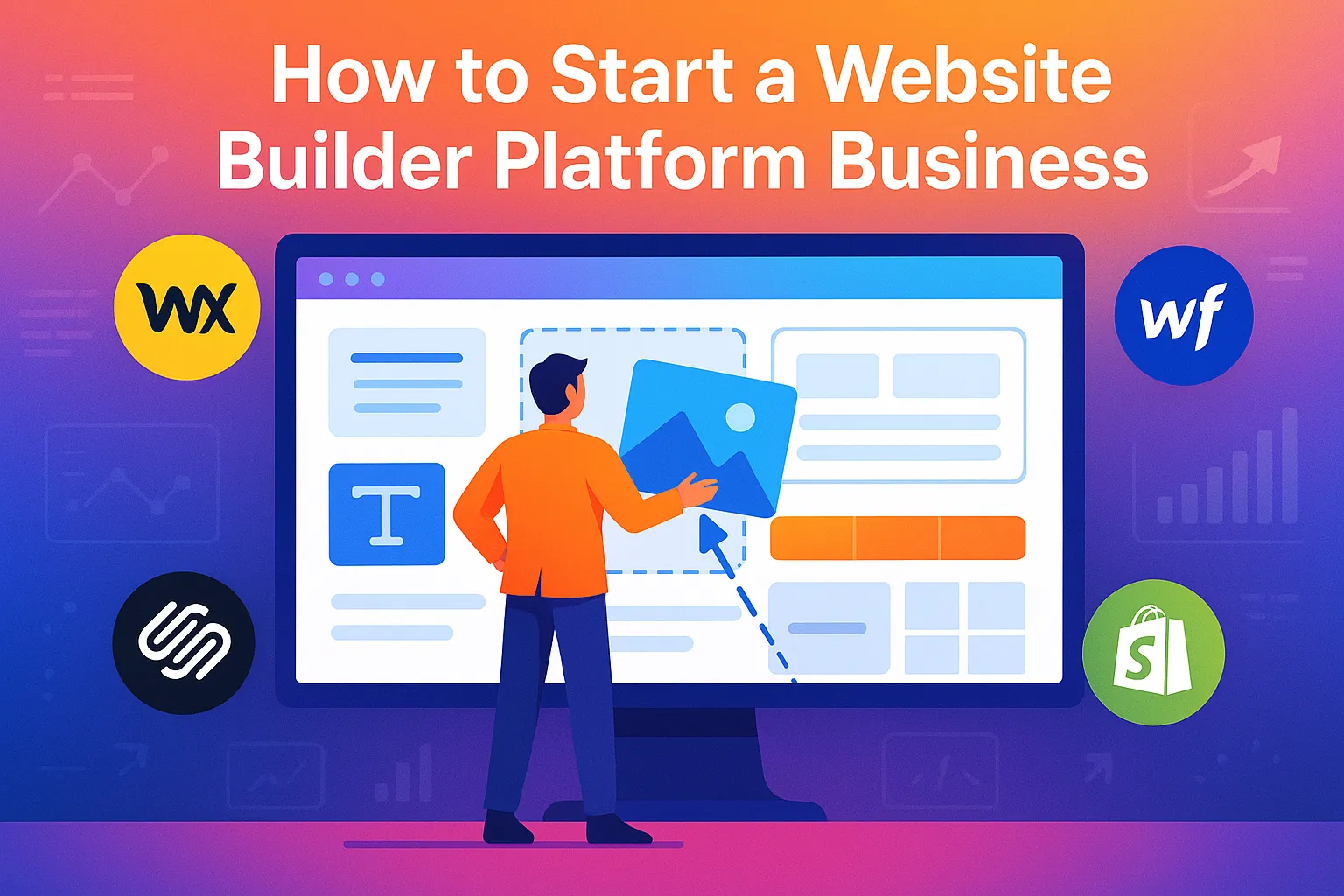You know that one friend who always has business ideas but gets stuck because they “need a website first”? Yeah — we’ve all got at least one. In today’s creator-fueled, side-hustle-hungry world, websites aren’t optional anymore — they’re launchpads. But here’s the thing: most people don’t want to code. They want drag-and-drop. They want speed. They want it done yesterday.
That’s why website builder platforms like Wix, Squarespace, and Webflow are raking it in. They simplify a messy, tech-heavy process for non-techies. And here’s the plot twist — it’s not too late to join the party. If you’ve ever dreamed of launching your own website builder platform business, the timing couldn’t be juicier. Demand is surging, AI is enabling low-cost dev cycles, and niche markets are wide open.
In this blog, we’ll break down exactly how to start your own website builder platform business — from ideation to monetization, with examples, strategies, and tips that don’t sound like a marketing brochure. And yes, if you’re thinking of fast-tracking this dream with a ready-made website builder clone app, Miracuves has your back.
What is a Website Builder Platform Business?
A website builder platform allows users — usually without technical skills — to create, customize, and publish websites using pre-designed templates, drag-and-drop tools, and built-in features like hosting, analytics, and SEO.
Popular Examples:
- Wix: Super intuitive, perfect for solopreneurs
- Squarespace: Stylish, polished, and popular with creatives
- Webflow: Advanced customization for designers/devs
- Shopify: Built for eCommerce, but its builder is strong
- Weebly: Simple and budget-friendly
- Zyro: AI-assisted features and lightning-fast setup
Pro Tip: These aren’t just platforms — they’re ecosystems with app stores, integrations, and even AI tools now.

Why Start a Website Builder Business Now?
Let’s talk timing. This space is exploding thanks to:
- Remote work creating more solopreneurs
- AI lowering barriers to entry for development
- The rise of digital creators, influencers, and online educators
- Small businesses going online post-pandemic
According to TechCrunch, over 500 million small businesses worldwide still lack a proper website.
That’s a massive market just waiting for someone to build the right tools.
Core Features Your Platform Must Have
Every successful website builder has a mix of foundational and delightful features. Here’s a breakdown:
Foundational Features
- Drag-and-drop editor
- Responsive design templates
- Built-in hosting
- Domain purchase/integration
- SSL security
Value-Add Features
- Blogging tools
- Contact forms & popups
- SEO optimization
- Analytics dashboard
- E-commerce integration
Smart/AI Features
- AI website generator
- Image auto-optimization
- Copywriting assistant
- Chatbot builder
Choose Your Niche — General vs. Specialized
Do you want to be the “next Wix”? Or the “Wix for personal trainers”? The more niche you go, the easier it becomes to market and monetize.
Examples:
- For Artists: Focus on portfolio layouts, galleries, digital sales
- For Restaurants: Include menu builders, reservation widgets
- For Coaches: Add landing pages, email funnels, booking calendars
Monetization Models That Work
Website builder platforms make money in more ways than one:
Subscription Plans
Offer tiered pricing based on features (free, basic, pro, enterprise)
White-Label Reselling
Let agencies resell your builder under their own brand
Add-On Marketplaces
Sell themes, plugins, analytics tools, or integrations
Transaction Fees
If you offer e-commerce, take a cut per sale (like Shopify)
How to Build Your Website Builder Platform (Without Reinventing the Wheel)
There are two ways to do this:
DIY Development
- Hire devs
- Build from scratch
- Spend 6–12 months
- Burn $$$
Fast-Track With a Clone App
Get a fully working, customizable website builder platform clone (like Wix or Squarespace) that’s:
- Scalable
- Feature-packed
- Ready to launch in weeks, not months
That’s exactly what Miracuves specializes in — building high-performance, white-label clone apps tailored to your needs.
Marketing & Growth Tips for Your New Platform
Here’s how to make noise without burning through your budget:
- Partner with niche influencers (e.g., design YouTubers)
- Offer lifetime deals on AppSumo or ProductHunt launches
- Create educational content (SEO + YouTube tutorials)
- Build a referral program — reward users who bring friends
- Launch a template marketplace where users can monetize designs
Future Trends to Watch in Website Builder Tech
Stay ahead by watching:
- AI-driven site creation (ChatGPT + image tools)
- Voice-command website builders
- AR/VR website layouts for virtual shopping
- Blockchain-powered domain integration (e.g., .eth)
These are no longer sci-fi ideas — they’re hitting MVP stages in 2025.
Conclusion
Launching your own website builder business isn’t just a smart idea — it’s a timely one. As more creators, businesses, and solopreneurs demand fast, no-code solutions, the demand curve is only heading up.We empower bold thinkers to bring their ideas to life faster, smarter, and profit-ready. Whether you’re launching a site builder for startups or a niche tool for creatives, we’ve got the tech muscle to make it happen. Let’s co-create your next digital success story.
FAQs
Q1. What is a website builder platform?
It’s a tool that lets users create websites without coding by using drag-and-drop interfaces, pre-built templates, and plug-and-play features.
Q2. Do I need to know how to code to launch one?
Nope. You can partner with dev teams or use a ready-made clone app to fast-track the process.
Q3. Can I make money from a website builder platform?
Absolutely. Through subscriptions, e-commerce fees, template sales, and even white-label licensing.
Q4. How long does it take to build one?
If you go custom, 6–12 months. With Miracuves’ clone solutions, you could be live in weeks.
Q5. How is this different from a CMS like WordPress?
Website builders focus on ease of use, visual editing, and speed. CMS platforms offer more complexity and flexibility but come with a steeper learning curve.
Q6. Is it too late to enter the market?
No way. Niches are still wide open, and AI is making it cheaper than ever to launch your own builder.








